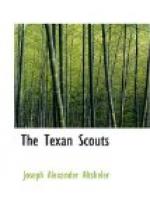The Mexican cavalry did not reappear upon the eastern road, and the Texans were exultant, yet they had lost two good men and their joy soon gave way to more solemn feelings. It was decided to bury the slain at once in the plaza, and a common grave was made for them. They were the first of the Texans to fall in the defence, and their fate made a deep impression upon everybody.
It took only a few minutes to dig the grave, and the men, laid side by side, were covered with their cloaks. While the spades were yet at work the Mexican cannon opened anew upon the Alamo. A ball and a bomb fell in the plaza. The shell burst, but fortunately too far away to hurt anybody. Neither the bursting of the shell nor any other part of the cannonade interrupted the burial.
Crockett, a public man and an orator, said a few words. They were sympathetic and well chosen. He spoke of the two men as dying for Texas. Others, too, would fall in the defence of the Alamo, but their blood would water the tree of freedom. Then they threw in the dirt. While Crockett was speaking the cannon still thundered without, but every word could be heard distinctly.
When Ned walked away he felt to the full the deep solemnity of the moment. Hitherto they had fought without loss to themselves. The death of the two men now cast an ominous light over the situation. The Mexican lines were being drawn closer and closer about the Alamo, and he was compelled to realize the slenderness of their chances.
The boy resumed his place on the wall, remaining throughout the afternoon, and watched the coming of the night. Crockett joined him, and together they saw troops of Mexicans marching away from the main body, some to right and some to left.
“Stretchin’ their lines,” said Crockett. “Santa Anna means to close us in entirely after a while. Now, by the blue blazes, that was a close shave!”
A bullet sang by his head and flattened against the wall. He and Ned dropped down just in time. Other bullets thudded against the stone. Nevertheless, Ned lifted his head above the edge of the parapet and took a look. His eyes swept a circle and he saw little puffs of smoke coming from the roofs and windows of the jacals or Mexican huts on their side of the river. He knew at once that the best of the Mexican sharpshooters had hidden themselves there, and had opened fire not with muskets, but with improved rifles. He called Crockett’s attention to this point of danger and the frontiersman grew very serious.
“We’ve got to get ’em out some way or other,” he said. “As I said before, the cannon balls make a big fuss, but they don’t come so often an’ they come at random. It’s the little bullets that have the sting of the wasp, an’ when a man looks down the sights, draws a bead on you, an’ sends one of them lead pellets at you, he gen’rally gets you. Ned, we’ve got to drive them fellers out of there some way or other.”




